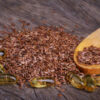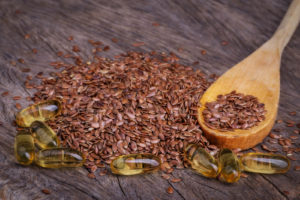
Vitamins and Nutrients to Fight Dry Eyes
As the weather gets dryer, it’s no secret that our eyes do too. Plus, our risk of suffering from dry eyes increases as we age. No one likes to feel dryness in their eyes on a daily basis, but unfortunately, that’s the reality for many adults. And, carting around eye drops isn’t always convenient, either. Are there any vitamins or nutrients that could help with dry eyes?
Luckily, the answer to that question is yes. Most would suggest artificial tears or eye drops, but these only provide temporary relief more often than not. If you want a permanent solution to your dry eyes, we have the absolute best vitamins and nutrients to help alleviate dry eyes and increase your natural tear production.
Dry Eyes: Causes and Symptoms
Dry eyes happen when your tear ducts are not producing enough tears. It’s estimated that up to 49 million Americans suffer from chronic dry eye. This is a problem because tears are essential to your eye’s health. They’re composed of three things: water, for moisture; oils, for lubrication; and mucus, for even distribution on the eye. Certain proteins and antibodies are also present in tears to prevent bacteria from causing infections.
When water, oil or mucus is low or missing in tears, it can cause dry eyes. When this happens you may experience several dry eye symptoms:
- Light sensitivity
- The sensation that sand or dust is in your eye
- Itching
- Redness in and around the eye
- Blurred vision
- General eye pain
Sometimes a symptom of dry eyes will be excessive tears, which can be a little confusing for you and your eyes. These tears are your body’s natural reaction to dry eyes, but they’re mostly made up of water. These water tears are missing the most important part, which is lubrication. Without the lubricant, these tears are pointless.
Besides this imbalance of water, oils, and mucus, several everyday occurrences can dry up the tear film on the eye. These include the following:
- Natural aging
- Menopause
- A side effect of certain prescription drugs such as birth control and antihistamines
- Certain diseases such as collagen vascular diseases and rheumatoid arthritis
If you think you may have dry eyes, talk to your doctor as soon as you can about it and to get a proper diagnosis.
 Vitamin and Nutrients
Vitamin and Nutrients
The best thing we can do for our eyes is to make sure we equip them with the proper vitamins and nutrients. We’ve picked out the very best of them to fight off and prevent dry eyes:
Flaxseed Oil
Flaxseed oil gets top billing because it is absolutely essential. This oil contains a high amount of an omega-3 acid called alpha-linolenic acid. When the body breaks down the alpha-linolenic acid, they break down into two types of omega-3 fatty acids called, EPA and DHA. These omega-3 fatty acids work to protect cell membranes throughout the body.
Flaxseed oil will alleviate symptoms of dry eyes as well as work to prevent them from occurring. There are a few ways to get flaxseed into your diet. Flaxseed oil capsules are a popular choice, but you can also grind flaxseeds and sprinkle them over your meals. Flaxseed hardly tastes like anything so it won’t ruin your meal by adding strange flavors.
Fish Oil
Another fatty acid that is an important part of eye health is fish oils. Fish oils also contain omega-3 fatty acids, EPA and DHA. Fish oil helps with eyesight as well as regulating and boosting brain activity.
The difference here between flaxseed and fish oils is that there’s no “middle man”. Your body won’t need to work to convert the fatty acids like flaxseed oil.
What this means is that you get a higher amount of EPA and DHA into your system. Alpha-linolenic acid in the body isn’t always totally converted to EPA and DHA. However, fish oils are sometimes the least appealing choice because of the smell.
Some would argue that fish oils are better than flaxseed oils, but the truth is they both do the same job. If you can stomach it, fish oils do the job faster. If not, or for vegetarians and vegans, flaxseed will have the same effects, you’ll just need to ingest more of it per day.
Like flaxseed oil, fish oil is also available in capsule form. You can also get it from a wide variety of delicious foods such as tuna and salmon.
Antioxidants
Antioxidants are the unsung heroes of eye healthcare. Because of the recent health craze surrounding antioxidants, they’re widely available in all sorts of forms, from juices to berries to supplements.
Antioxidants help fight free radicals in the body. When too many free radicals are present, it will cause damage to the eyes, including dry eyes. These free radicals are sometimes caused by aging, but can also be related to a poor diet and lack of exercise.
To get the most antioxidants out of your diet, fill your meals with berries and brightly colored vegetables for optimal results.
Potassium and Zinc
Potassium and zinc are a match made in heaven. For the eyes, this means double the amount of nutrients! Studies have shown that patients suffering from dry eyes are often low on potassium in the body, which doctors believe may have a correlation to their eye health.
The best way to get the amount of potassium your body needs is through foods like bananas, raisins, kelp, pecans, dates, avocados and figs.
Zinc, on the other hand, is important to enzymes that coat the eyeball. Zinc can be found in fish, kelp, mushrooms, legumes and sunflower seeds.
Incorporating these vitamins and nutrients into your everyday diet can also be very time-consuming. For days when life is just too much and you barely have time to think about eating, let alone think of what to eat, we have the Ocu-Plus Formula. This unique formula will give your eyes all that you need to stay healthy and avoid dry eyes.
Artificial tears and eye drops will give your dry eyes temporary relief, but if you want to be rid of your dry eyes and prevent this condition from coming back, you’ll need to make some relatively easy changes to your diet. Most nutrients are available in supplement form, so there’s no reason not to do it.
Our Rebuild Your Vision Ocu-Plus Formula Contains All 17 Vitamins, Minerals, and Herbal Supplements to Improve Your Eye Health!












Leave Your Reply